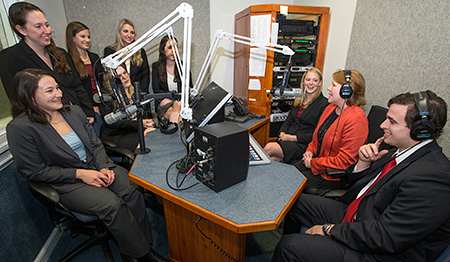"This is a Global Tel Link prepaid call from — Adnan Syed — an inmate at a Maryland correctional facility."
Each week, about a million listeners eagerly await the sound bite that begins "Serial," the hit podcast from the producers of "This American Life." "Serial" recently introduced its worldwide audience to the Innocence Project at the UVA School of Law, whose students and faculty supervisor are tracking down new leads in a 1999 murder case featured on the show. The school's for-credit clinic and a related pro bono clinic give students who participate the chance to investigate and potentially to litigate wrongful convictions that may lead to exoneration.
Episode 7 of the expected 12-part series, released earlier this month, features clinic director Deirdre Enright and third-year law students Mario Peia and Katie Clifford discussing inconsistencies in the case. Adnan Syed was a 17-year-old Baltimore high school student when his ex-girlfriend, Hae Min Lee, was found strangled to death in a park. Despite apparently lacking a strong motive, Syed was sentenced to life in prison for her murder. Syed has always maintained his innocence.
The engaging murder mystery has become a sensation, with Apple reporting that the podcast has become the fastest to reach 5 million downloads and streams in iTunes history. But members of the Virginia team said they never predicted how popular or expansive the reporting would turn out to be.
"Zero idea," Enright said, with her students echoing agreement.
"We thought maybe it was going to be one episode of 'This American Life,'" Clifford said.
UVA Law Agrees to Assist
Syed read in prison about Justin Wolfe, a Virginia death row inmate who had a defense team that included the Innocence Project at the UVA School of Law, and saw similarities to his own case. This led "Serial" co-creator and narrator Sarah Koenig to interview Enright about those similarities and to hash out with her some of the unusual aspects of the Syed case. Their conversations form the bulk of Episode 7, titled "The Opposite of the Prosecution."
Koenig wonders aloud why Syed doesn't have better answers for questions that could help his case, and if the truth of his guilt or innocence will ever be known. But Enright says innocent people often do a lousy job of aiding their own defense. She also expresses confidence in her methodology for helping them.
"What happens to me is this: I reach a tipping point where I have answered most questions to my own satisfaction, and I have answers for everything," Enright says.
Eventually, Enright makes Koenig an offer to help track down some of the unanswered questions.
"It's a lot of leg work, [but] if we had a team of five students we could get those things done with people who are being supervised, so think about that," Enright tells her. "I'm totally hooked."
A flabbergasted Koenig accepts.
In fact, Enright added eight students to the case — five from the project's for-credit clinic and three from the pro bono clinic. Pro bono students began work on the project in early March.
Team leader Peia and pro bono clinic president Clifford recorded their in-studio segment for "Serial" upon returning from spring break. Having read through all of the files, they tell Koenig that, like Enright, they have serious doubt about Syed's guilt.
"One of the things I found odd when I first started reading this case was how precisely [Syed] was convicted under this amount of material," says Peia, an aspiring prosecutor who will be clerking in the U.S. District Court for the Eastern District of Pennsylvania following graduation.
Clifford notes during the interview that forensics reports were missing from Syed's file for some physical evidence that was collected.
"We are curious about the results we don't have," she says.
Working on the Case
In addition to reviewing the material Koenig and her colleagues collected, the students investigated new leads of their own, which "Serial" has not reported on as of Episode 9. Peia said the team worked by trying to answer questions they had about Syed and others closely linked to the victim, then widening their circle.

Now, "We've got these alternate suspects — very legitimate alternate suspects," Enright said.
Earlier in the fall, members of the team visited the Baltimore Police Department's Homicide Cold Case Unit, and drafted a motion for forensic testing of evidence that could potentially implicate one of the alternate suspects, and exonerate Syed. Enright, a 1992 graduate of UVA Law, has enlisted the help of another alum — her brother-in-law Paul Enzinna '87, a Maryland attorney. They are currently deciding when to file the motion.
"I don't know if this will be the ending of the first show or the beginning of the next," Enright said.
Regardless, students will continue developing leads into next semester. Members of the team, which is mostly comprised of second-year law students, said the experience they've gained on the case, and the exposure they've received, can only help their careers. Most anticipate working for law firms either before graduation or starting out, and they said firms are always interested in attorneys who have experience that would be useful on pro bono cases.
Other students hope to work specifically in criminal defense or, in Peia's case, prosecution.
"The Innocence Project has been fantastic for learning prosecutorial ethics. By seeing what happens when things go very wrong in the criminal justice process, one can learn how to avoid these problems before they come to fruition," Peia said.
Editor's note: New episodes of "Serial" are available for download every Thursday at 6 a.m. Eastern, with the exception of this Thanksgiving, at serialpodcast.org.
Founded in 1819, the University of Virginia School of Law is the second-oldest continuously operating law school in the nation. Consistently ranked among the top law schools, Virginia is a world-renowned training ground for distinguished lawyers and public servants, instilling in them a commitment to leadership, integrity and community service.


